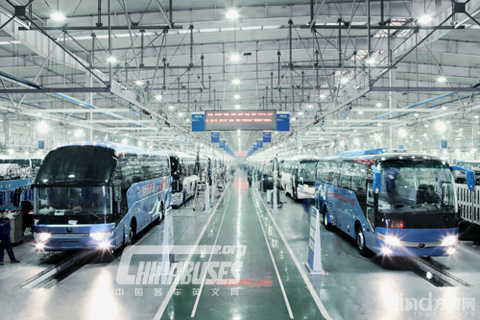In recent years, Yutong has been taking the lead in globalizing its brand in the international market. Take Venezuela for example, the total number of Yutong buses in the country has long surpassed 4,000 units. Moreover, the company has successfully sold its buses to Venezuela’s Ministry of Transport, Ministry of Tourism, Ministry of Defense, and the Caracas Metro Company. Just a few days ago, Tang Yuxiang, president of Yutong, and Haiman Troudi, Transport Minister of Venezuela signed a new memorandum of 1,500 units of buses. According to the memorandum, Venezuela will also purchase related spare parts, maintenance tools, intelligence bus operation & management systems. After a comprehensive research of bus operation conditions in Venezuela, Yutong has incorporated its state-of-art safety technologies and energy-saving technologies into its bus fleet. What’s more, the GPS, real-time monitoring and e-ticket will help Venezuela build internationally advanced intelligence bus management system.

Yutong also signed a cooperative framework agreement with the Ministry of Industry and Ministry of Land Transport for building bus joint ventures in the country. This clearly shows that the bus maker’s cooperation with Venezuela has well extended from selling bus products and providing technological supports to the construction of intelligence bus operation system and the localization of Yutong buses.
Currently, Yutong is playing a predominant role in Venezuela, holding 95% of its bus market. Along with the deepening ties between China and Latin America and the rising demand for buses in Venezuela, Yutong has made impressive achievements in the country and greatly strengthened the presence of buses from China, slashing a brand new way of globalization.
What lessons can other China’s bus makers draw from Yutong’s successful internationalization? According to Tang Yuxiang, Yutong is the only bus brand from China that has set up six service & maintenance stations in Venezuela so far. Each station, with an average service radius of about 280 kilometers, provides after-sale services, maintenance services and spare parts. Moreover, an after-sales service team which is composed of 25 experienced engineers from China and ten engineers from Venezuela are appointed to provide assistance around the clock for its customers. Besides, Yutong has set up a comprehensive customer training system. In the meantime, it has built two warehouses storing its over 2,500 types of spare parts. At each warehouse, the inventory is usually kept at an approximate value of 1.5 million USD.
By setting up its own after-sales service stations, Yutong has also succeeded in taking its strong hold in Cuba and a number of other countries in Latin America. So far, Yutong’s sales networks have covered over 20 countries and regions in Latin America. The company has also sold over 10,000 units of buses in the whole region with a total export value of about one billion USD. As early as 2013, Yutong exported about 2,200 units of buses to Latin America, accounting for about 40% of China’s total export volume of large and medium buses in that year.
In sharp contrast with Yutong’s internationalization strategies, other China’s auto brands show a number of weaknesses in the globalization process. Nowadays, it can be clearly seen that almost every China’s auto brand is eager to strengthen its market presence in the foreign countries. In the past few years, Chinese auto brands can be readily found in a number of countries in the third world. However, these domestic brands usually forget to improve the quality of their products and promote their brands. Instead, they try to win customers by cutting prices, which sends quite disruptive signals to local market and creates a dog-eats-dog competition environment.
According to Tang Yuxiang, Yutong accounted for 33.6% of China’s bus export from January to May this year. It continued to take the lead in China’s bus industry. While Yutong’s performance is certainly enviable, its globalization strategies are also worth our close attention.